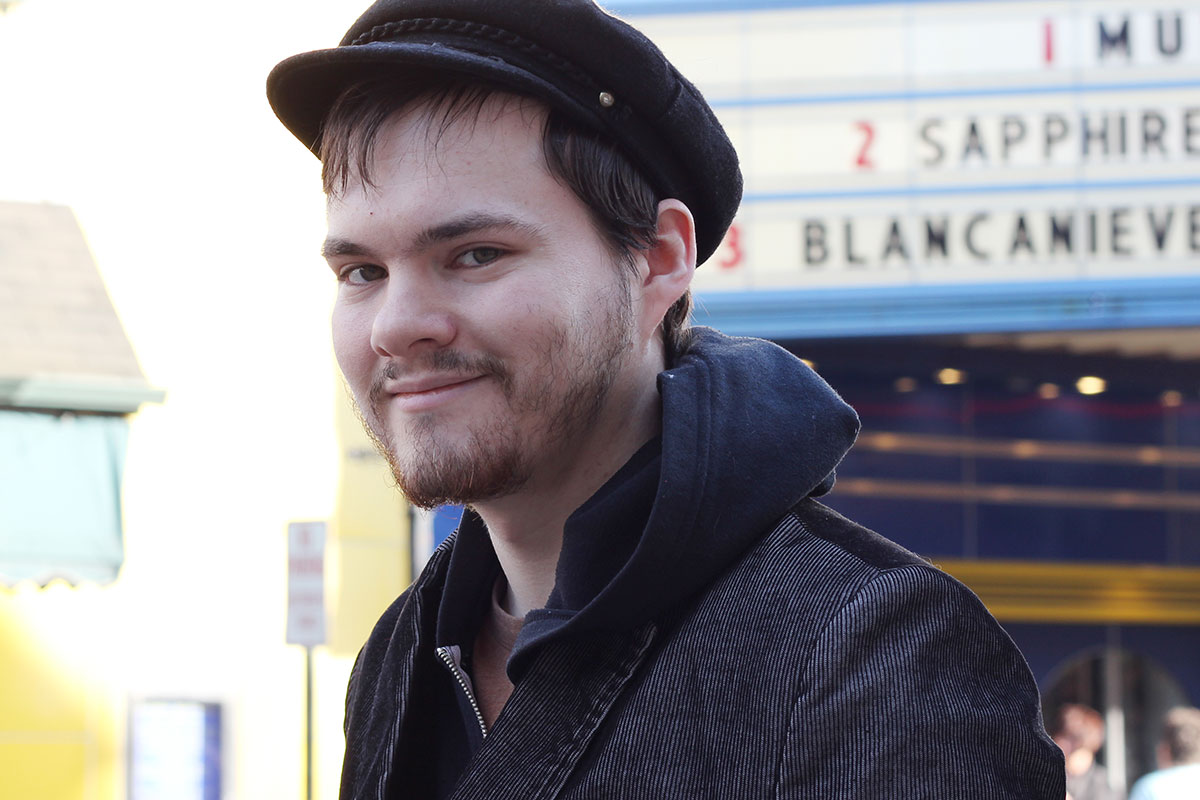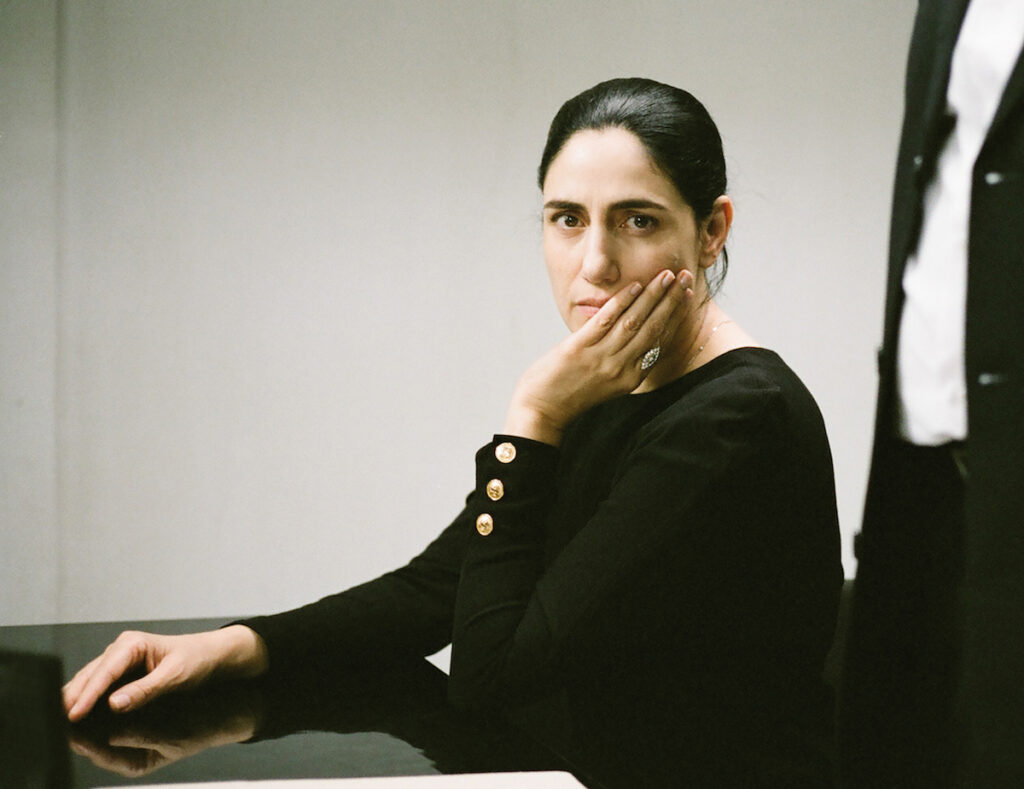Last year, many Western viewers got their first glimpse at one of the best kept secrets of Israeli cinema. A woman sits alone, not saying anything while her attorney speaks on her behalf. A few feet away from her, we learn, is the husband she desperately needs to divorce so that she can feel some measure of control. She says everything she needs to with her silence, her purposeful glares at the few corners of this tiny sterile courtroom. Her unforgivingly dark hair remains stuck to her head as if reminding her to keep composure during this humiliating ordeal. And then suddenly, when a particularly chatty and clueless witness is called before the stand, she starts laughing. She can’t help herself, though you can see her trying. The situation is too funny. Life is insane, she allows herself to realize, listening to her friend talk honestly about the marriage she’s attempting to dissolve. She’ll sit there and listen to it all, but she won’t keep quiet when it makes her laugh or causes her such anger that she can’t help but shout at the misogynist judges sitting and staring down at her like self-appointed gods. “Someday, someone will take the power from your hands!” She yells, and faintly in the background, her fury and steadfastness is such that you almost feel as if she’s speaking for every woman in the Middle East who was ever latched to a life they didn’t choose. But where did this force of nature come from?
The year is 1990. A magician is looking for volunteers for his slick little magic show in a crowded dinner theatre. He trains his spotlight on a few women in the audience. “Who will be the lucky one? Who will it be? Who has the power?” Just then he points his spotlight into a corner of the room and discovers her. Ronit Elkabetz, the woman who leads the magician into darkness and magic. When his trick is over, she vanishes for real, and he becomes obsessed by her. The film was called “The Intended,” and though it was her first on-screen appearance, the world of Israeli film was similarly bewitched by this woman. During her short career she won three Ophir Awards (the Israeli Oscar), a lifetime achievement award from the Israeli Film Academy and the France Culture award at the Cannes Film Festival. Many of her early roles are in films about the intersection between magic and the Jewish faith as an escape from modern life. Later, she dove head first into making movies about the horrendous circumstances from which these same people were trying to escape. She offered up her body as a sacrificial object to be spread across a celluloid altar so that audiences in and out of Israel knew what guts it took just to get out of bed every morning.
She specialized in playing misfits, winning her first Ophir for the film “Sh’Chur,” where she plays a woman who may have mystical powers but has been confined to an asylum. She’s removed by a nervous relative who’s seeing the same mental illness manifesting in her own young child. Elkabetz is the family albatross, the link between the untenable past and an uncertain future. Her belief in something outside of reality once lifted her from the depressing milieu of ’80s Israel, but now it marks her as an outcast. Something to be pitied and feared. She’s electrifying in these two films. Her shock of pitch black hair and corpse’s complexion clash like a ship sailing through stormy seas. Her dark, serious eyes, her thin figure hidden under black smocks and dresses, her musical voice and busy hands. She became known for playing the monster under the bed, the still-living skeleton in the closet, the chain smoking pariah of every family tree. She was like a cross between Anna Magnani and Elizabeth Taylor; obscenely gorgeous, lousy with ambition and talent.
She caught the wider world’s attention in Dover Kosashvili’s “Late Marriage.” A schlubby young man is ferried back and forth between appointments with young women by his parents for a half hour, before Zaza (Lior Ashkenazi), finally escapes their watchful eye and makes a phone call. His parents want him to marry an eligible young woman, but he’s been shacking up with a divorced mother played by Elkabetz. She’s nervous, impatient and absolutely irresistible, and we know right away this won’t end well. Zaza’s parents get wind of their relationship and a gang of men storm her apartment to threaten her into leaving him. That image, of Elkabetz surrounded by overbearing, violent and proud men, would become a recurring motif in her cinema. Elkabetz, like Isabelle Huppert, has a way of taking over every film she steps in and “Late Marriage” is absolutely hers from the minute she answers that phone call. Every moment she’s off-screen we miss her sweat-soaked charisma, her fearless insouciance. Clearly, this woman was just beginning to spread her wings.
Over the next few years she’d make similarly painful studies of blind male violence, including “Or,” where she plays an immature prostitute who watches while her daughter replace her as both breadwinner and sex worker. She made the subtle crowd-pleaser “The Band's Visit,” which recieved much acclaim when it played in the states, as well as more harsh issue movies like “Ashes and Blood,” “Turk’s Head” and “Zion and His Brother,” where she plays the mother of two boys who can’t stay out of trouble, a fussy queen regent who holds her boys in a Freudian spell even though she can’t buy them new shoes. But what Elkabetz ought to be remembered for is when she decided that no one knew how to better utilize her unique talent and looks than herself. With her brother Shlomi, she fashioned a new heroine for an age of slow but forceful female empowerment called Viviane Amsalem. She directed herself as Viviane for three truly marvelous films.
When we meet Viviane in “To Take a Wife,” she has just made a scene which her entire extended family has come over to mediate. The camera finds Elkabetz as she messes her face up in mental agony while she’s surrounded by men who don’t understand why she wouldn’t want to be with her husband Eliahou (Simon Abkarian). He doesn’t drink, he doesn’t cheat, he has a job. What more could she want? The three films in the Amsalem saga (“To Take A Wife,” “Seven Days” and “Gett: The Trial of Vivian Amsalem”) show the depths to which a woman must sink in order to prove that there is more to life than the bare minimum. That women must be given freedom at all costs to make their own decisions or they will go mad. In each film, Elkabetz showcases her remarkable range, her restraint surrounded by hordes of nosy relations, her defiance in the face of government officials who view her and her plight as unseemly and slight, her tragic lashing out at a husband who can’t be made to understand that his passive aggression and stubbornness hurt worse than if he were outright abusive. No one in Viviane’s life gets why she hates living with Eliahou. Simon Abkarian portrays him like a perfect storm of “nice.” The man who speaks reasonably, and has an answer to everything, who thinks he’s doing his wife a favor everytime he takes some piece of her responsibility from her. It took quite a bit of specificity on the part of both Abkarian and the Elkabetz siblings to dream up a man who could effortlessly annoy and enervate spectators without ever coming across as a monster, which is what Viviane’s relations expect from the way she rails against his unfailingly calm demeanor.
Elkabetz knew more about modern gender relations than just about any filmmaker, and she had a truly remarkable eye with which to present them. Her three films behind the camera are beautiful, yes, but they’re also confidently withholding. Elkabetz frames herself like an imprisoned angel, whose inner light only escapes when no one’s watching. “Gett” in particular should be studied by every aspiring actress or director. Here is how you project a lifetime of emotional abuse without opening your mouth. Here is how you film a performance. Elkabetz was the tortured and twisted heart of Israeli cinema, any and all women forced into metaphysical and social abjection, and the precious little work she left us ought to be treasured. She appeared as if by magic and was gone before we knew her secrets or seen everything she had to share with us. Elkabetz played the mother, sister, wife and friend of every soul who knows the sound of misery all too well, the woman who can’t and won’t help how she feels. Who props those around her up through her resilience. We will never see her kind again.












